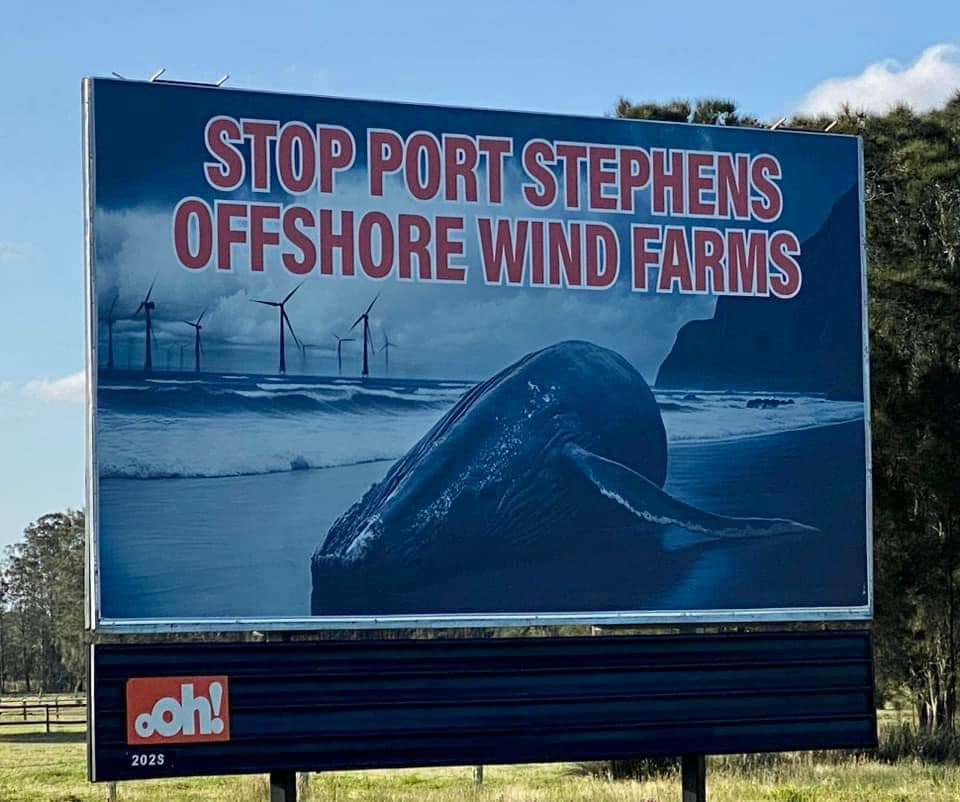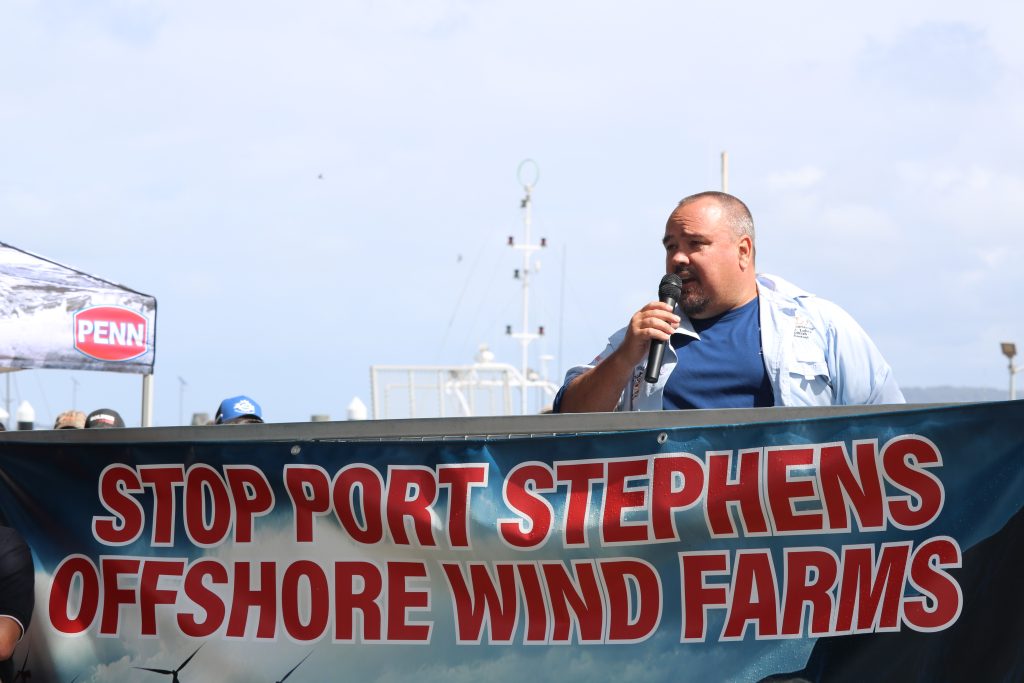
PORT STEPHENS is currently at the centre of a national misinformation debate, with the independent Member for Warringah, Zali Steggall, taking aim at billboard advertising employed by anti-offshore wind farm groups in the region.
The billboard in question, located along a prominent Port Stephens roadway, displays offshore wind turbines alongside a beached whale, accompanied by the tagline ‘Stop Port Stephens Offshore Wind Farms’.
“Currently, we have a scare campaign running on our coast, implying that, somehow, offshore wind turbines will cause whale deaths, with no evidence to support the claim – no data,” Ms Steggall told the House of Representatives last Monday.
Steggall also described the billboard, which did not originally display an authorisation, as “a clear case of misleading and deceptive advertising”.
“There is no scientific study to back up the claim being made,” she said.
“But people, ordinary people going about their lives with a genuine concern, are impacted by this misleading and deceptive advertising.”
Ms Steggall was in Parliament last week to discuss her Commonwealth Electoral Amendment (Voter Protections in Political Advertising) Bill 2023, citing the Port Stephens billboard as an example why the bill is necessary.
Steggall said the Bill aims to protect Australia’s electoral processes from misinformation and disinformation.
“I again call upon the House to protect voters from misleading and deceptive political advertising,” Ms Steggall said.
“In consumer advertising, claims in ads and promotions need to be true, accurate and based on reasonable grounds. “Any claims advertised must be able to be proved.
“Yet politicians and political advertising are not held to the same standard.”
Troy Radford from the Newcastle Port Stephens Game Fish Club, one of the organisers of the billboard, said the roadside display does not constitute misinformation.
“I personally believe whales will be impacted and (offshore wind development) will cause whale deaths,” Mr Radford told NOTA.
“If I believe and other people believe, how can it be misinformation?
“Whales use sonar when they are out in the ocean.
“When they start building these turbines it puts a lot of noise pollution in the water, which affects them, and then you get the electromagnetic fields off the cables and off the turbines themselves.”
The billboard, operated by oOh!media, has since been authorised, but Mr Radford believes it shouldn’t need to be.
“It is not a political billboard,” he said.
“Where is anything political in there?
“There is not one political party mentioned – it is about concerned Port Stephens residents that are really up in arms about a proposed offshore wind ‘factory’ that will potentially affect marine life, our environment and tourism.”
Mr Radford said the original idea for the billboard was simply to “inform the public”.
“To inform the public, you need something eye-catching and something that will create a conversation.
“That’s what it has done.”
According to Ad Standards, Australia’s advertising regulator, political advertising is “advertising that attempts to influence or comment on political matter”.
“Some material will obviously be political matter – for example, an advertisement designed to affect how a person will vote in an election,” the Ad Standards website states.
“However, it is not necessary for material to explicitly promote a political party, candidate or policy for it to be considered political matter for this purpose.
“If an ad is principally directed towards influencing public opinion on a matter of public controversy, or promotes the interests of a group organised to influence public opinion, it is also likely to be considered political matter.”
Mr Radford also hit back at claims that local anti-wind farm campaign efforts had been funded or directed by fossil fuel companies.
“It was from donations from the community,” Mr Radford said of the origin of funds used to purchase the billboard.
“People contacted us and said ‘here is some money, we need to put something up to warn people of these potential environmental disasters that can happen’.
“I can tell you, hand on my heart, that not one cent has been given to us from any political party and not one cent has come from any fossil fuel company.
“Saying it (our campaign) is all run by political parties and donations from coal and fossil fuel companies is misinformation, because none of that is the case.”
Since the announcement of consultation for a Hunter offshore wind zone in February 2023, debate has steadily been growing in Port Stephens, spurred on by the official declaration of the zone in July.
The wellbeing of whales has been a constant feature of discussion throughout.
Earlier this month, a post to Facebook group ‘No Offshore Wind Farm for the Illawarra’ referred to a University of Tasmania study supposedly published in the Marine Policy journal that predicted offshore wind turbines “could kill up to 400 whales per year”.
This claim was widely shared in anti-wind farm social media groups.
However, Quentin Hanich, the journal’s editor-in-chief, confirmed that the research paper did not exist and that the study had never been undertaken.
Unexplained whale deaths in the United States in recent years have ramped up fears that offshore wind farm activity could be the cause, further fuelled by an incendiary documentary by American journalist Jonah Markowitz.
The film, ‘Thrown to the wind’, is often cited by local opponents to wind farm development as evidence of the dangers of offshore renewables.
“Our film exposes the price the world is actually paying for the industrialisation of our oceans by offshore wind corporations: the killing of whales and the potential extinction of an entire cetacean species,” the film’s promotional website states.
Despite Markowitz’ claims, America’s National Oceanic and Atmospheric Administration (NOAA) maintains that “no whale mortality has been attributed to offshore wind activities”.
They also note that “there are no known connections between any of this offshore wind activity and any whale stranding regardless of species” and “there is no information that would support any suggestion that any of the equipment that’s being used in support of wind development for these site characterisation surveys could directly lead to the death of a whale”.
While environmental groups such as Greenpeace suggest research indicates that offshore wind farms do not directly kill whales, other impacts on the species during construction and operation remain to be seen.
A 2014 study titled ‘Assessing environmental impacts of offshore wind farms: lessons learned and recommendations for the future’, published in Aquatic Biosystems, found the the major environmental concerns related to offshore wind developments to be “increased noise levels, risk of collisions, changes to benthic and pelagic habitats, alterations to food webs, and pollution from increased vessel traffic or release of contaminants from seabed sediments”.
The research also found that for marine mammals, the “most significant consequences of offshore wind farm construction and operation are likely to occur as a result of avoidance of construction noise or structures rather than direct mortality”.
Both the government and major offshore wind developers agree that detailed environmental assessments need to be undertaken during the feasibility phase.
“From obtaining a licence to declaring a successful project, that’s five to seven years of work of doing studies and surveys, doing geotechnical and geophysical investigations, studying the marine environment, working out the impact on fishing, whales and dolphins,” Dave Johnson, the CEO of offshore wind developer EDF Renewables Australia told NOTA in September.
“If your impact is too great then you’re not going to get an environmental approval.”
By Doug CONNOR

